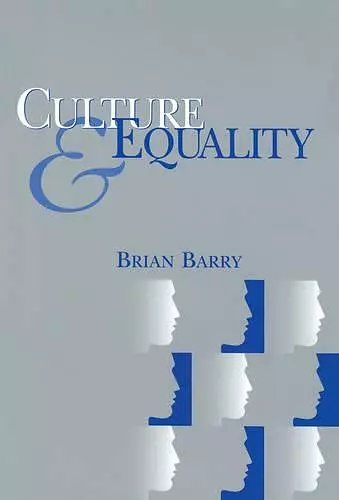Culture and Equality
An Egalitarian Critique of Multiculturalism
Format:Paperback
Publisher:John Wiley and Sons Ltd
Should be back in stock very soon

All major western countries today contain groups that differ in their religious beliefs, customary practices or ideas about the right way in which to live. How should public policy respond to this diversity? In this important new work, Brian Barry challenges the currently orthodox answer and develops a powerful restatement of an egalitarian liberalism for the twenty-first century.
Until recently it was assumed without much question that cultural diversity could best be accommodated by leaving cultural minorities free to associate in pursuit of their distinctive ends within the limits imposed by a common framework of laws. This solution is rejected by an influential school of political theorists, among whom some of the best known are William Galston, Will Kymlicka, Bhikhu Parekh, Charles Taylor and Iris Marion Young. According to them, this 'difference-blind' conception of liberal equality fails to deliver either liberty or equal treatment. In its place, they propose that the state should 'recognize' group identities, by granting groups exemptions from certain laws, publicly 'affirming' their value, and by providing them with special privileges or subsidies.
In Culture and Equality, Barry offers an incisive critique of these arguments and suggests that theorists of multiculturism tend to misdiagnose the problems of minority groups. Often, these are not rooted in culture, and multiculturalist policies may actually stand in the way of universalistic measures that would be genuinely beneficial.
'Defenders of multiculturalism are called to task by the esteemed political philosopher Brian Barry in this critique of the "politics of difference". Barry argues that multiculturalist policies do not advance the values of liberty and equality but foster strident nationalism by focusing on what divides people at the expense of what unites them...' Audrey Stratham, Scotland on Sunday
'Brian Barry, in [his] recent and controversial work on multiculturalism ... argues that contemporary multicultural practice, which stresses the rights and separateness of ethnic minority and other communities within nation states, harms those governments that are most committed to the provision of greater social justice - the central plank of new Labour.' John Lloyd, New Statesman
'A liberal, Robert Frost wrote, is someone who can't take his own side in an argument. The goal of Culture and Equality is to free liberals of their disabling scruples and in particular those deriving from those currently prevalent ideas that are variously called "multiculturalism" or the politics of "difference" or "recognition" or "identity" ... a defender of liberal principles who seeks confidently to take his own side in an argument must also be on the lookout for ideas and arguments that challenge their basis. Barry meets such challenges with assertion.' Times Literary Supplement
'In this robust, clear-headed and wide-ranging assault on the contemporary multiculturalist debate in political theory Barry takes few prisoners. He exposes much cant, wooly mindedness and confusion. He treads on many toes and makes few apologies, yet this is a deeply serious and important book.' European Sociological Review
'This is one of the most important books that I have read on the question of multiculturalism ... a very well-balanced book and one, which I would hope, will transform the debate about multiculturalism and equality.' Innovation - The European Journal of Social Science Research
'It is a trenchant, robust, vigorously and rigorously argued counterblast in the name of liberal egalitarianism against those, especially fellow egalitarian liberals, who defend the politics of multiculturalism. ... No short review can do full justice to the richness of Barry's book. It combines erudition, unabashed defence of liberalism, a passion for the point of liberal politics, and a finely tuned sensitivity to the idiocies of simple-minded multiculturalist apologetics. There are excellent discussions of, inter alia, education, "culture", the costs of group membership, and the free exercise of religion. David Archard, Contemporary Political Theory
"This is an important and stimulating book that deserves to be pondered deeply." Andrew Wright, Studies in Philosophy and Education
- Short-listed for British Academy Book Prize 2002
ISBN: 9780745622286
Dimensions: 228mm x 154mm x 31mm
Weight: 624g
416 pages